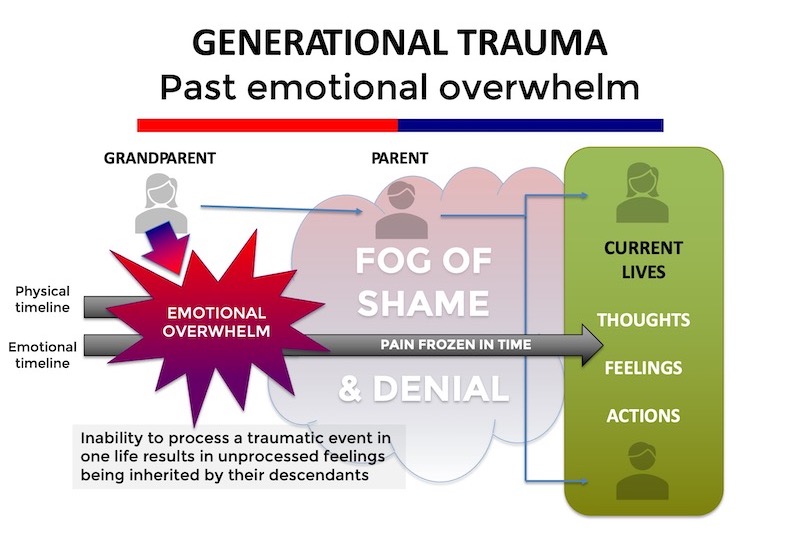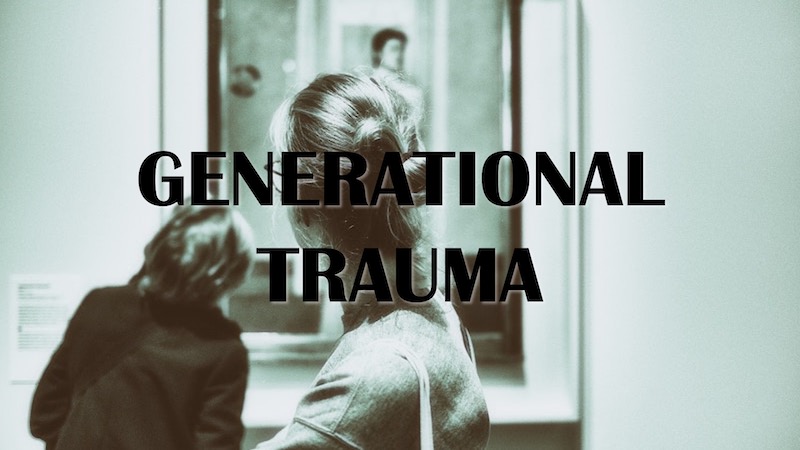7 Symptoms of generational trauma
- 19 February 2024
- Posted by: Michael H Hallett
- Category: Generational trauma ,

One of the difficulties in identifying generational trauma—or even believing that it’s real—is the wide array of symptoms that may present.
Inherited traumas are instances of past emotional overwhelm, situations that one of your ancestors could not handle in the moment it happened. The unresolved pain of those experiences becomes frozen in time. Overwhelm can occur in a variety of situations, leading to a great variety of symptoms.

The cause is lost in a fog of shame and denial. It continues to impact the thoughts, feelings, and actions of later generations.
The list below is by no means exhaustive. It’s a quick sketch of symptoms that may indicate generational trauma.
1. Family fragmentation
Families that are spread out and splattered, not just geographically but emotionally.
People may leave their home community and travel to the ends of the earth to get away from oppressive family dynamics. My family did this in the 1920s when two of my great-uncles emigrated from Britain to New Zealand in the wake of their father’s conviction for tax fraud.
Emotional fragmentation is present when families may be close geographically but there is little or no communication between members. Siblings may have only cursory contact (e.g., only on birthdays and Christmas) or have lost contact altogether. Children may have ‘flown the nest’ and are rarely in touch.
2. Financial difficulties
Patterns of poverty, financial struggle and failure may be passed down through the generations. Arguably the cause might be poor role modelling but approaching it as generational trauma provides a structured way to address the root cause.
In my own family, multiple members had tax problems—despite the fact that my great-grandfather’s tax trial had been ‘swept under the carpet’ and only surfaced after 99 years.
Financial difficulties can also manifest when wealthy families fall out over inheritances and succession planning.
3. Repeating destructive patterns
As well as financial difficulties, repeating patterns can include ill health, being prone to alcoholism, gambling, or marriage breakdowns due to infidelity repeating over multiple generations.
In her memoir of family trauma, The Architect of Desire, Suzannah Lessard candidly writes: “Thrashed, I thrashed my sisters.”
4. Missing or mistaken family narrative
One of the less obvious symptoms of generational trauma is a missing or mistaken family narrative—the stories we tell about ourselves.
A family narrative may be entirely missing—no memorabilia, ancestors never spoken about—or partially missing. In my family’s case, there’s a blank in the late 1920s to early 1930s when my grandmother had an affair that destroyed her marriage. It’s unclear who was living where or when, or doing what, until a cogent narrative resumes on the other side of the break.
Mistaken narratives (where the truth turns out to be different from the perceived truth) are difficult to identify. As children, we accept whatever family narrative is (or isn’t) presented to us as the truth. Only genealogical sleuthing can resolve this.
One reason people don’t tackle generational trauma is from an unconscious fear of discovering their family narrative may be inaccurate: the symptoms rumble on.
5. Inability to engage with family memories
The inability to engage with family memories is an indicator of unresolved trauma. Memories may be physical memorabilia, spoken memories, or geographic locations where significant events happened.
Memorabilia may be thrown out, photograph albums buried in lofts and ignored for decades. Attempts at conversation shut down. Visits to childhood locations declined.
A friend of mine has a suitcase of family memorabilia. She’s aware of it as a malevolent presence and has unsuccessfully tried to offload it onto other family members. There’s something there that needs looking at but she’s not yet ready to do it.
6. Inappropriate grief
Unexpressed grief from a death in a previous generation can be carried forward and projected onto a death in the current generation. Typically, the unexpressed grief relates to a sudden death, such as an accident or unexpected ill health.
A high school friend of mine was completely overwhelmed by his mother’s death. He was barely functional at the funeral. Grief can also be prolonged over extended periods of time without resolution. Such levels of grief suggest that something more than the immediate death is in play.
7. Emotional paralysis
A common element among all symptoms of generational trauma is emotional paralysis. There’s a ‘stuckness’ (made up word), an inability to grasp or grapple with a situation. It is well known as a symptom of Post-Traumatic Stress Disorder.
People live with discordant situations for years, even decades, seemingly imprisoned by some invisible glue that keeps them rooted in past pains.
If any of this resonates, you don’t need to stay stuck. Reach out.
Next steps
For further resources on generational trauma, both free and paid, please click on this image.
Photo by Laura Fuhrman on Unsplash


A fantastic albeit sobering read. Known for years but brought to the light of day through your words. I’m the family member who has moved away from deeply oppressive destructive dynamic, 17,200km to be precise, youngest of 5, fragmented HSP with CPTSD and arrested development at 40 puts it mildly. I appreciate your articles very much, thank you for this incredibly healing resource of information.
Many thanks, Noelle. Glad to hear the articles have been helpful.
I can relate to the distance very much — my family has spent the last century ping-ponging between Britain and New Zealand trying (and failing) to get away from itself.
If I can help any further please reach out.
Michael